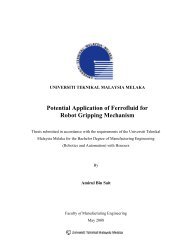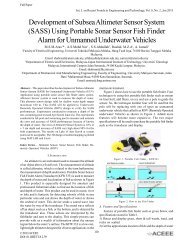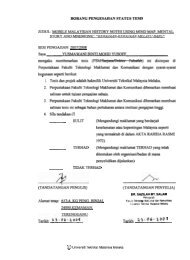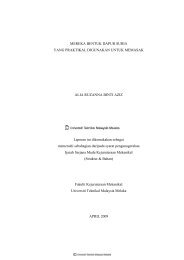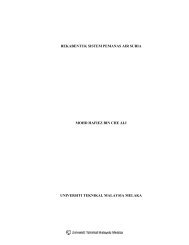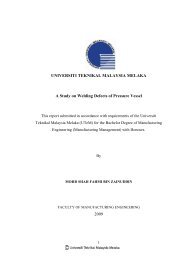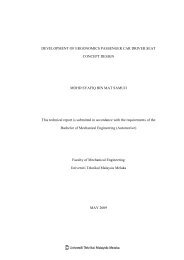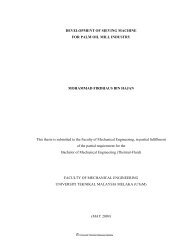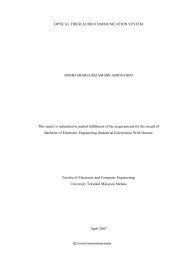Brand, Identity and Reputation: Exploring, Creating New Realities ...
Brand, Identity and Reputation: Exploring, Creating New Realities ...
Brand, Identity and Reputation: Exploring, Creating New Realities ...
Create successful ePaper yourself
Turn your PDF publications into a flip-book with our unique Google optimized e-Paper software.
Malaysia‘s Global Halal Hub – ―a huge opportunity to fail!‖<br />
Shahidan Shafie, Univesiti of Malaya, Malaysia<br />
This is a purely qualitative-based research employing in-depth interviews, field observations <strong>and</strong> focus group<br />
discussions on the subject of halal. Halal is an Arabic term which means ―permissible.‖ In food, halal is defined as<br />
―food not made of, or containing parts of animal origin which Islamic law forbids.‖ Halal covers the aspects of<br />
slaughtering, storage, display, preparation, hygiene <strong>and</strong> sanitation. In the Muslim-majority Malaysia, this concept is an<br />
absolute key to consumption. Marketers who intend to penetrate Malaysia‘s mass market must know the halal-status of<br />
their products.<br />
Malaysia has incorporated Halal agenda in the past four Strategic Plans. In the current Ninth Malaysia Plan (covering<br />
the year 2006-2010), the Government has indicated that Malaysia will be developed as a center for the certification of<br />
Halal products. In addition, the Malaysia‘s Halal certification initiative h<strong>and</strong>led by its Department of Islamic<br />
Development (or locally known as JAKIM) - a division under the purview of the Prime Minister‘s Department, has<br />
been tasked to promote this certification process worldwide.<br />
During the tenure of the previous Prime Minister (Datuk Seri Abdullah Hj. Ahmad Badawi) the halal hub project<br />
appeared to complement well with the Prime Minister‘s effort to promote the concept of civilized Islam, also known as<br />
―Islam Hadhari.‖ Malaysia which claims to be a model of a progressive <strong>and</strong> moderate Islamic nation was also the<br />
previous Chairman of the 57-nation Organization of Islamic Conference (OIC). This effort is being seen as a strategy to<br />
capitalize on Malaysia‘s high st<strong>and</strong>ing among the OIC countries.<br />
In order to increase the awareness of Malaysia‘s halal initiatives among the international communities, the Ministry of<br />
International Trade <strong>and</strong> Industry has set-up branch offices abroad to facilitate the promotion of Malaysia‘s halal hub<br />
infrastructure. Kuala Lumpur also has successfully held halal-related conferences <strong>and</strong> exhibitions. One of them is the<br />
Malaysian International Halal Showcase which is regarded as the biggest halal-related exhibition worldwide.<br />
Malaysia‘s launch of the Halal St<strong>and</strong>ards (M.S. 1500:2004) is another initiative to show to the world its commitment to<br />
make Malaysia the benchmark for halal certification. This st<strong>and</strong>ard was also adopted by the World Health<br />
Organization‘s Codex Alimentarius.<br />
Despite the heavy investments to promote halal hub globally, Malaysia appeared to face many internal <strong>and</strong> external<br />
challenges which, if not address urgently, will represent a ―huge opportunity to fail‖ in this effort.<br />
Among the issues that need to be addressed include: the inconsistency of definition of halal on the aspect of<br />
slaughtering of animal; the difference in views involving consumption by different school of thoughts (madzhabs); the<br />
introduction of halal logo by individual firms; the promotion of the Islamic Manufacturing Practices (IMP) based on the<br />
concept of Halalan Toyyiban (Halal <strong>and</strong> Wholesome) which may confuse the public; the rampant display of Quranic<br />
scriptures <strong>and</strong>/or Arabic characters at restaurants <strong>and</strong> food-serving outlets (to indirectly signal that the premises offer<br />
halal foods); the use of Arabic-sounded or Islamic br<strong>and</strong> names such as the case of a toothpaste br<strong>and</strong>; the<br />
unavailability of Halal Act; the continuous changes in the role of JAKIM <strong>and</strong> Halal Development Council (HDC); <strong>and</strong><br />
the lack of collaboration among the world‘s halal-certification authorities which could undermine the ―market value‖ of<br />
halal among the consumers, especially the Muslims.<br />
It appears that the Halal awareness in Malaysia continues to rise, not so much from the promotional efforts held by the<br />
authorities but more due to the media highlights over controversies on the misused of halal certification <strong>and</strong> logo. These<br />
cases involved the local as well as international food-processing companies, local <strong>and</strong> global fast-food franchise<br />
operators as well as local poultry <strong>and</strong> abbatoirs. One of the biggest blunders involved the IKEA furniture outlet‘s<br />
restaurant.<br />
These cases demonstrate the challenges faced by the authority with regards to the enforcement. The lack of enforcement<br />
by the personnel of the Department of Islamic Development could be attributed to the inexistence of a law specific to<br />
the issues of halal. Currently, JAKIM has had to depend on the assistance from the Ministry of Domestic Trade &<br />
Consumer Affairs in monitoring this sort of cases. This is due to the fact that halal currently falls under the Ministry‘s<br />
Trade Description Act 1972 as a result, only the Ministry officials could act on the culprits. The lack of enforcement has<br />
apparently caused the public to question the validity on some of the products claiming to be halal.<br />
Furthermore, there were reports that within the government bodies themselves, there seem to be lack of cooperation.<br />
The Department of Islamic Development sometimes fails to get assistance from the Ministry of Domestic Trade &<br />
Consumer Affairs which is seen to be ―more authoritative.‖ However the latter Ministry also has its own problems –<br />
those that not necessarily relate to halal products (e.g. fighting pirated VCD distribution, price fixing, false in-store<br />
9



